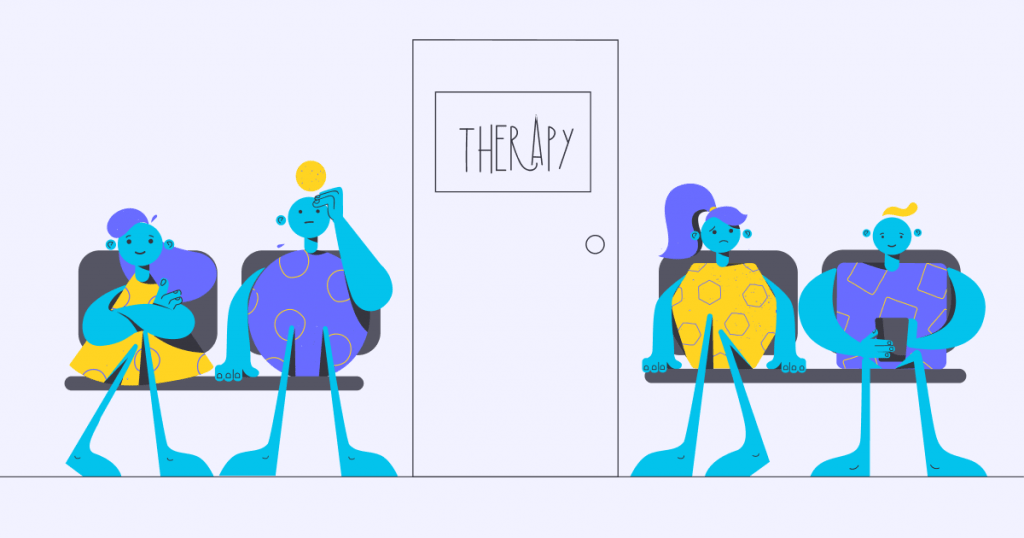
Mentale Gesundheit
27. April 2021 — 3 Minuten Lesezeit
Es ist gar nicht so leicht, sich in diesem „Psychodschungel“ zurecht zu finden. Kennst du eigentlich die Unterschiede zwischen Psycholog:in, Psychotherapeut:in und Psychiater:in? Im Folgenden erfährst du, was genau diese Berufsgruppen unterscheidet.

Psycholog:innen haben ein Psychologiestudium mit dem Abschluss Diplom (Dipl.) oder Master of Science (MSc.) absolviert. Dadurch sind sie jedoch nicht berechtigt, psychische Erkrankungen in einer Psychotherapie eigenständig zu behandeln. Unter Supervision einer approbierten Psychotherapeut:in (siehe weiter unten), oder im Rahmen der Ausbildung zur Psychotherapeut:in, ist es jedoch auch Psycholog:innen möglich, psychische Erkrankungen psychotherapeutisch zu behandeln.
Eigenständig dürfen Psycholog:innen psychologische Beratung bei Krisen und Problemen, denen keine psychische Erkrankung zugrunde liegt, anbieten. So findet man Psycholog:innen ohne zusätzliche psychotherapeutische Ausbildung meist in Beratungsstellen.
Hinweis: Der Begriff „psychologische Berater:in“ ist in Deutschland nicht geschützt. Auch Angehörige anderer Berufsgruppen ohne psychologisches Studium oder fundierte Ausbildung können sich so nennen und z.B. Coaching und Beratungen zu bestimmten Themen anbieten.
Psychologische Psychotherapeut:innen sind Psycholog:innen, die nach dem Studium (Dipl. oder MSc.) eine sogenannte Approbationsausbildung zur Psychotherapeut:in gemacht haben. Die Approbationsausbildung umfasst eine mindestens 3-jährige Grundausbildung, in welcher neben theoretischen Lehreinheiten auch 2400 praktische Stunden unter Supervision abzuleisten sind. Nach erfolgreichem Abschluss der Approbation sind psychologische Psychotherapeuten berechtigt, eigenständig psychotherapeutische Behandlungen anzubieten und diese mit den Krankenkassen abzurechnen.
Ärztliche Psychotherapeut:innen haben Medizin studiert und sich durch eine Facharzt-Weiterbildung auf den Bereich Psychiatrie und Psychotherapie spezialisiert oder haben eine Zusatz-Weiterbildung in Psychotherapie erlangt. Somit sind sie berechtigt, psychische Erkrankungen durch Psychotherapie zu behandeln und mit den Krankenkassen abzurechnen. Anders als psychologische Psychotherapeut:innen sind sie durch ihr Medizinstudium zusätzlich berechtigt, Medikamente zu verschreiben.
Psychiater:innen haben Medizin studiert und danach einen Facharzt für Psychiatrie und Psychotherapie erlangt. Bei Psychiater:innen steht die körperliche, medizinische und medikamentöse Behandlung von psychischen Erkrankungen im Vordergrund. Psychotherapie wird von Psychiater:innen in der Regel nicht angeboten. Dazu stehen Psychiater:innen aber meist in engem Kontakt mit den behandelnden Psychotherapeut:innen ihrer Patient:innen.
Um eine sogenannte Heilerlaubnis als Heilpraktiker:in zu erlangen, wird kein Universitätsstudium vorausgesetzt. Sprich Heilpraktiker:innen haben in der Regel weder Psychologie noch Medizin studiert. Es ist lediglich ein Selbststudium mit anschließender Prüfung beim Gesundheitsamt notwendig. Heilpraktiker:innen haben also keine wissenschaftlich anerkannten Methoden zur Behandlung von psychischen Erkrankungen erlernt. Dadurch kann ein großer Unterschied in der Behandlungsqualität entstehen.
Offiziell dürfen Angehörige diese Berufsgruppe sich nicht „Psychotherapeut:in“ nennen, können dies jedoch als Zusatz in ihrer Berufsbezeichnung angeben. So ließt man z.B. oft Praxis für Psychotherapie nach dem Heilpraktikergesetz, Heilpraktiker:in für Psychotherapie oder zugelassen zur Psychotherapie nach dem Heilpraktikergesetz.
Wir empfehlen dir, dich bei der Suche nach einem Therapieplatz auch über die Qualifikationen der jeweiligen therapieanbietenden Person zu informieren. Meist sind diese auf Homepages in der „Über mich/ zur Person“-Sektion zu finden. Scheue dich auch nicht, dies im Gespräch direkt zu erfragen.
Als erste Anlaufstelle ist es empfehlenswert, dich an deine Hausärzt:in zu wenden. In der Regel begleitet dich deine Hausärzt:in schon ein wenig länger und kennt deine bisherige Krankengeschichte. Sie:er kann mit dir zusammen einschätzen, welche Form von Unterstützung du benötigst und dir dabei helfen, entsprechende Schritte einzuleiten.
Hinweis: Viele psychische Erkrankungen werden von körperlichen Symptomen begleitet, beeinflusst oder möglicherweise auch verursacht. Deshalb ist es ist zunächst ebenfalls wichtig, körperliche Symptome über deine Hausärzt:in abklären zu lassen.